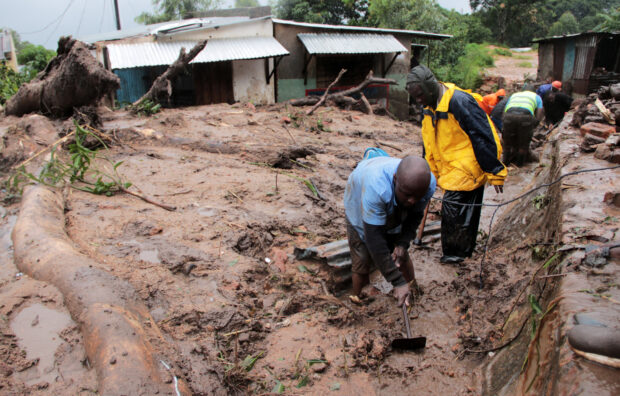Storm Freddy kills more than 100 on return to Mozambique, Malawi

Men dig in search of survivors and victims in the mud and debris left by Cyclone Freddy in Chilobwe, Blantyre, Malawi, March 13, 2023. REUTERS
BLANTYRE, Malawi/MAPUTO — Mozambique and Malawi on Monday were counting the cost of Tropical Storm Freddy, which killed more than 100 people, injured scores and left a trail of destruction as it ripped through southern Africa for the second time in a month over the weekend.
Freddy is one of the strongest storms ever recorded in the southern hemisphere and could be the longest-lasting tropical cyclone, according to the World Meteorological Organization.
It pummeled central Mozambique on Saturday, ripping roofs off buildings and bringing widespread flooding around the port of Quelimane, before moving inland towards Malawi with torrential rains that caused landslides.
The full extent of the damage and loss of life in Mozambique in particular is not yet clear, as the power supply and phone signals were cut off in some parts of the affected area.
The storm has killed 99 people in Malawi, including 85 in the main commercial hub of Blantyre, said the commissioner of the Department of Disaster Management Affairs, Charles Kalemba, at a press briefing.
Article continues after this advertisementThe total number killed by storm Freddy in Mozambique, Malawi and Madagascar since it first made landfall last month is now around 136.
Article continues after this advertisementThe central hospital in Blantyre had received at least 60 bodies by early afternoon, Doctors Without Borders (MSF) country director Marion Pechayre told Reuters by telephone, adding that some 200 injured were being treated in the hospital.
The injuries were from falling trees, landslides and flash floods, she said. “A lot of (houses) are mud houses with tin roofs, so the roofs fall on people’s heads.”
Police spokesperson Peter Kalaya told Reuters that rescue teams had been looking for people in Chilobwe and Ndirande, two of the worst-affected townships in Blantyre, the country’s second-largest city, where it was still raining on Monday and many residents were without power.
“Some missing people are feared buried in rubble,” Kalaya said.
Critical situation
Malawi’s national electricity company EGENCO said that power generation capacity was unstable and that it had experienced total system shutdown twice on Monday. It has shut down all major hydro power stations to protect them from damage, it said.
At least ten people died in Mozambique’s Zambezia province, a provincial delegate from the National Institute of Disaster Risk Management, Nelson Ludovico, said on public broadcaster Radio Mozambique, adding that the figures were still provisional.
“The situation is critical in Zambezia province. We can’t advance with an accurate picture of the scale of damage because there’s no communications with all the regions,” Health Minister Armindo Tiago said on public radio.
Guy Taylor, chief of advocacy, communications and partnerships for U.N. children’s agency UNICEF in Mozambique, told Reuters from Quelimane that humanitarian agencies there did not have the capacity to deal with a disaster of this size.
“We saw a lot of destroyed buildings and clinics. People’s homes had their roofs torn off by the wind. Even before the cyclone hit we saw localized flooding,” he said.
The wind had died down on Monday but there was still a lot of flooding that had destroyed crops and created a risk of waterborne diseases, he said.
Mozambique has seen more than a year’s worth of rainfall in the past four weeks.
Malawi has been battling the deadliest cholera outbreak in its history, and U.N. agencies have warned the situation could now get worse.
Scientists say fossil fuel-driven climate change is making tropical storms stronger, as oceans absorb heat from greenhouse gas emissions and when warm seawater evaporates heat energy is transferred to the atmosphere.
RELATED STORIES